As digital marketing agencies continue to embrace remote work, the challenge of leading a successful remote team has become increasingly important.
Digital agency owners need help maintaining effective communication and collaboration among their remote employees. However, leading a remote team to success is not merely the same as managing a successful remote team.
Grunt Workers specializes in hiring elite digital marketers to build your successful remote digital marketing team.
This article is about the shift to remote work – which requires a different approach to communication and collaboration, making it crucial for digital agency owners to understand and adopt new best practices for remote team leadership.

As digital marketing agencies continue to embrace remote work, the challenge of leading a successful remote team has become increasingly important.
Digital agency owners need help maintaining effective communication and collaboration among their remote employees. However, leading a remote team to success is not merely the same as managing a successful remote team.
The shift to remote work requires a different approach to communication and collaboration, making it crucial for digital agency owners to understand and adopt new best practices for remote team leadership.
Digital agency owners prioritizing remote team leadership can improve their team’s productivity, motivation, and overall satisfaction, leading to a more prosperous and profitable agency. You must invest in tools and strategies that support clear communication and be proactive in establishing these channels.
The key to remote team leadership is effective communication and collaboration. Building trust, fostering community, and ensuring inclusiveness are also essential for remote team success.
By focusing on these critical areas and following best practices, digital agency owners can lead their teams to a productive, efficient, and enjoyable remote work environment.
In this blog post, we’ll explore the key elements of remote team leadership and provide actionable tips and best practices for digital agency owners looking to lead their remote teams to success.
Why is Remote Team Leadership Important for Digital Agency Owners?
Remote work has become the norm for many digital marketing agencies. In fact, according to a recent study, over 80% of agencies agree that using remote employees improves productivity. And of these agencies, 1 in 5 said they have gone 100% virtual, meaning all their employees work remotely. (Source)
And so the success of a digital marketing agency depends on the success of its remote teams. Effective remote team leadership is the key to unlocking that success.
Digital agency owners have unique responsibilities and must ensure that their remote teams are productive, collaborative, and aligned with the agency’s goals.
There are several reasons why remote team leadership is crucial for digital agency owners.
- Digital agencies rely heavily on teamwork and collaboration to produce successful campaigns and projects. This can be challenging when team members are not physically present. It is up to the leader to find new ways to facilitate collaboration and ensure everyone works together effectively.
- Digital agencies constantly evolve, and remote teams must adapt quickly to change. A successful remote team leader must communicate new ideas, strategies, and projects clearly and effectively and inspire their team to embrace change and remain productive.
- Digital agency owners are responsible for maintaining a positive and productive work culture, even when team members are not in the same physical location. A strong remote team leader must build trust, foster a sense of community, and create a supportive environment where team members feel valued and motivated to do their best work.
Leading a remote team goes beyond just managing one.
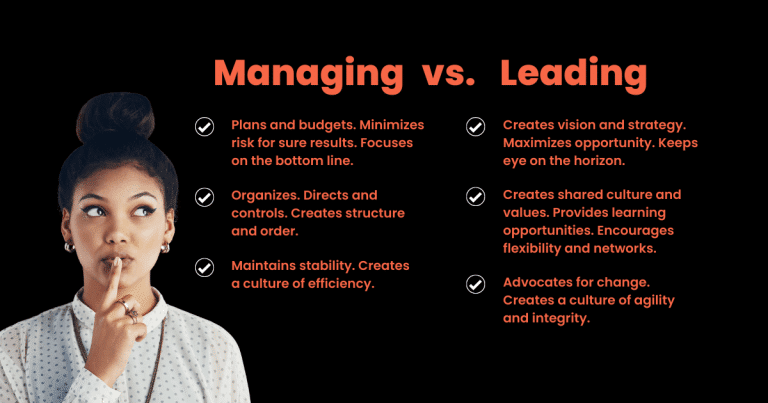
Leading a remote team goes beyond managing your various agency teams.
While leading and managing both require effective communication, collaboration, and organization, leadership also involves inspiring, guiding, and empowering team members to achieve their full potential.
The best remote team leaders understand their team’s strengths, weaknesses, and motivations and use this knowledge to foster a positive work environment that promotes growth, productivity, and innovation.
In contrast, remote team management tends to focus more on tasks, schedules, and deadlines. Managers may delegate tasks, monitor progress, and ensure that team members meet their responsibilities.
While these are essential components of remote work, more is needed to lead a remote team to success.
To truly lead a remote team, digital agency owners must take a holistic approach that considers all aspects of remote work, including technology, culture, and team dynamics.
Leadership is a competitive advantage.
The ability to lead a remote team effectively is not only a key differentiator but also a key driver of success for digital agencies.
A strong remote team leader can set their digital agency apart by creating a supportive and productive remote work environment.
By leading their remote team effectively, digital agency owners can create a culture of excellence, innovation, and collaboration that drives business growth and success.
Moreover, having practical remote team leadership skills can help digital agency owners stay ahead of the curve as remote work becomes increasingly prevalent.
With more and more companies adopting remote work practices, the need for capable remote team leaders is growing. Those who invest in their leadership skills will be better positioned to succeed in this new business landscape.
The Benefits of Remote Work (for Digital Agency Owners and Employees)

Remote work has become a prevalent trend in the modern workplace, and it offers a wide range of benefits for both digital agency owners and employees. Some of the most notable benefits include increased flexibility, reduced costs, and improved work-life balance.
For digital agency owners, the ability to hire top talent from anywhere in the world can be a major advantage.
This allows employers and business owners to build a team of experts with diverse skills and experiences, leading to more creative and innovative solutions for clients.
Remote work can also reduce costs for digital agencies by removing the need for physical office space and reducing commuting costs for employees.
Schall 2019 says, remote work can help improve employee morale and job satisfaction, leading to higher engagement and better job performance.
The Unique Challenges of Leading a Remote Team

Leading a remote team comes with its own challenges, and digital agency owners must be equipped to handle them.
These challenges are not typically faced by traditional, co-located teams and can make remote team leadership a unique and complex task.
Challenge #1: Communication and collaboration
One of the biggest challenges is ensuring effective communication and collaboration among team members. Remote work often requires a shift in communication and collaboration practices, and digital agency owners may struggle to adapt to these changes.
Challenge #2: Team morale
Another challenge remote team leaders face is maintaining team morale and engagement. Without the physical presence of team members, it can be harder to build and sustain a positive team culture.
Additionally, remote workers may experience feelings of isolation and disconnection, which can negatively impact their motivation and productivity. To overcome these challenges, digital agency owners must proactively foster community and connection among their remote team members.
These particular challenges are unique to remote teams because they stem from remote teams being geographically dispersed and not in the exact physical location.
Challenge #3: Accountability and productivity
In a remote setting, it can be difficult to maintain accountability among team members and ensure that everyone is productive. This can be incredibly challenging for digital agency owners, who may be used to more traditional forms of management and communication.
Unlike in a physical office environment, remote team members are not in constant visual contact with one another, making it harder to keep track of progress and identify areas that need improvement.
To lead remote teams effectively, leaders must overcome these unique challenges and find new and creative solutions to maintaining effective communication, collaboration, and team cohesion.
The Role of Technology in Remote Team Leadership
In a remote work setup, technology serves as a substitute for the face-to-face interactions that would occur in a traditional office environment.
As such, digital agency owners need the right tools to facilitate communication and collaboration among their remote team members.
These tools can help digital agency owners overcome some of the unique challenges of remote team leadership, such as accountability and productivity.
- Project management software can help keep remote teams on track and ensure everyone knows their responsibilities and deadlines.
- Video conferencing tools can facilitate virtual meetings, enabling remote team members to stay connected and collaborate effectively.
- Instant messaging platforms can help remote teams communicate quickly and easily, even when not working in the same location.
Technology plays a vital role in remote team leadership. Digital agency owners who invest in the right tools can improve communication, collaboration, accountability, and productivity among their remote team members, leading to a more successful and efficient remote work setup.
Actionable Tips and Best Practices for Remote Team Leadership
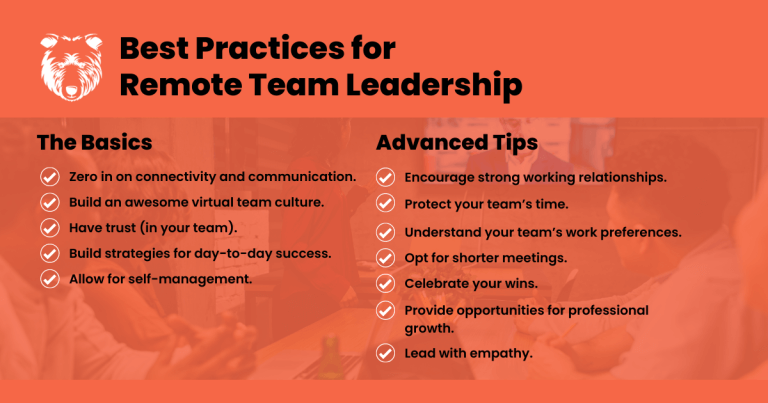
Here are a bunch of actionable tips and best practices for remote team leadership that you can implement to ensure your team is functioning at its best, no matter where they are located.
We can divide this list into two: The Basics and Advanced Tips.
The basic tips and practices in leading remote teams are the fundamental principles that form the foundation for success. These must-follow guidelines help establish structure, communication, and collaboration among remote team members.
- Zero in on connectivity and communication.
- Build an awesome virtual team culture.
- Have trust (in your team).
- Build strategies for day-to-day success.
- Allow for self-management.
And then here are more advanced tips and practices in leading remote teams; strategies from the experts that help optimize and improve the success of remote teams. This selection of advanced tips are what takes remote teams to the next level.
- Encourage remote team members to develop and maintain strong working relationships.
- Understand your team’s work preferences.
- Protect your team’s time.
- Celebrate your wins.
- Opt for shorter meetings.
- Provide remote team members with opportunities for professional growth.
- Lead with empathy.
Let’s dive further into each of these best practices.
1. Zero in on connectivity and communication.
Digital marketing agencies transitioning to remote work have found that a distributed workforce brings many benefits, capabilities, and efficiencies.
To fully realize these benefits, you must focus on connectivity and communication among remote team members.
You must be intentional about using digital tools and platforms supporting remote communication, collaboration, and project management. Choose tools can help your team stay connected and on the same page, regardless of location.
In addition, it’s important to establish clear communication protocols and expectations for your remote team. This might include setting guidelines around response times for emails and messages or scheduling regular check-ins to ensure everyone is on the same page.
By leveraging technology and establishing best practices, remote team leaders can create a collaborative and productive virtual work environment.

2. Build an awesome virtual team culture.
In an article, Yana Valchanova writes, “Culture is what happens when the managers leave the room…(it is) doing what’s right in the absence of authority.”
Building an awesome virtual team culture is crucial to the success of remote teams. One key element is creating a culture of trust, accountability, and transparency.
When team members feel valued and empowered, they are more likely to be engaged and productive. Digital agency owners can achieve this by clearly communicating expectations and creating an environment where everyone feels comfortable sharing their ideas and concerns.
Another critical aspect of building a robust virtual team culture is ensuring everyone understands their roles and responsibilities. This means setting clear expectations for tasks and deliverables and providing regular feedback on performance.
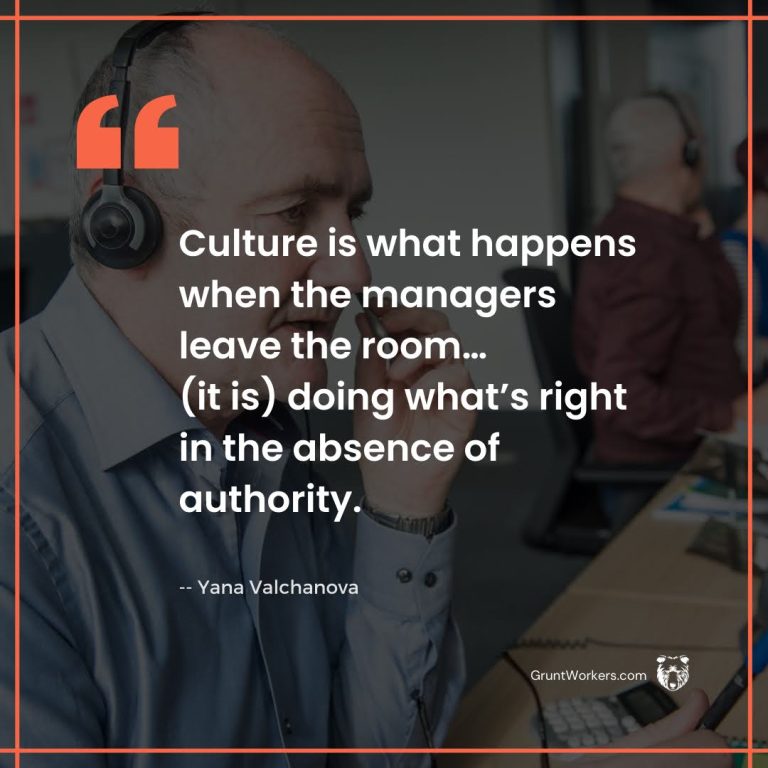
3. Have trust (in your team).
Trust empowers team members to work at their highest potential without feeling micromanaged or unsupported.
It creates an environment where team members feel comfortable taking ownership of their responsibilities and making independent decisions that benefit the team’s overall success.
To build trust within your remote team, you must create an environment where team members feel respected, appreciated, and valued. Encourage open and honest communication, create a safe space for feedback, and regularly recognize and celebrate individual and team accomplishments.
Foster a culture of trust where team members can rely on each other to meet goals and deadlines, and everyone understands their role in the team’s success.
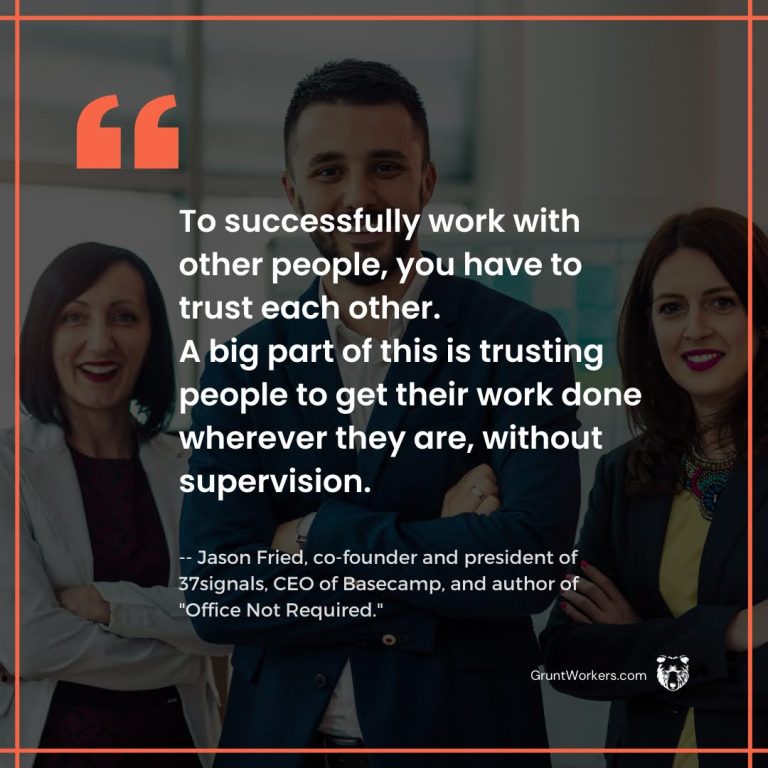
4. Build strategies for day-to-day success.
Forbes.com recommends that you build and implement strategies to ensure your daily success.
While trust is critical, ensuring that team members meet their responsibilities and deliver quality work is equally important.
You can set clear expectations and hold team members accountable for their performance by establishing regular check-ins, setting goals, and tracking progress.
Set clear expectations to ensure everyone is on the same page. This means being specific when assigning tasks and setting deadlines. Instead of being vague, explain what needs to be done, when it’s due, and what the end goal is.
Ensure that the tasks you assign are realistically attainable each day and can be met. Overloading your team with unachievable tasks can lead to burnout, frustration, and decreased productivity.
By setting clear and reasonable expectations, you can help your team work efficiently towards their goals while feeling supported and motivated.

5. Allow for self-management.
You must also foster a culture of self-management. This is especially crucial for younger workers struggling with a fully remote work schedule.
Give your team members the freedom to work autonomously. By allowing for self-management, you help your team members develop valuable skills and improve their overall job satisfaction.
As a result, they will be more engaged and motivated to perform at their best.
To encourage self-management, provide your team with the tools and resources they need to succeed, such as clear guidelines, templates, and processes. Set goals and metrics to measure progress and provide regular feedback to help your team stay on track.

6. Encourage remote team members to develop and maintain strong working relationships.
In addition to regular online huddles, encouraging remote team members to develop and maintain strong working relationships can be a key factor in remote team success.
Best-selling author and inspirational speaker Simon Sinek recommends a regular, weekly online huddle without discussing work, deadlines, schedules, or anything.
The person assigned to lead the huddle would pose a funny or poignant question, such as “What’s on your heart or mind?” or some other query around those lines.
“And we start to see each other as human and we start to empathize,” Sinek says. “We start to create relationships. And we start to get to know each other. But it’s done prescriptively,”
Sinek reminds us that the goal is to make regular interactions like these happen to build trust and genuine relationships.
7. Understand your team’s work preferences.

In a remote work environment, it’s also important to recognize that everyone works differently, and what works for one team member may not work for another.
As a leader, you can make an effort to get to know each team member on an individual level and understand what motivates and inspires them.
One way to do this is by conducting regular check-ins or one-on-one meetings to discuss their preferences for communication, feedback, and social interaction.
Some team members prefer frequent video conferencing or instant messaging, while others prefer written communication through email or project management tools.
Additionally, understanding their preferred work schedule, whether it’s working during traditional business hours or more flexible hours, can help you plan team meetings and deadlines accordingly.
And don’t forget to ask for feedback from your team about what’s working well and what can be improved to ensure that you’re meeting their needs and creating a positive work environment.

8. Protect your team’s time.
In a remote work setting, protecting your team’s time is important to ensure they can focus on their work and not get bogged down with distractions.
As a leader, it’s crucial that you set an example and actively protect your team’s time.
“Time and attention is perhaps the most valuable asset we really have in a team to be able to get work done,” says Claire Lew of KnowYourTeam.com. “And yet in a remote environment, oftentimes when there’s so much communication happening…it’s actually really difficult for your team to get real work done.”
One effective way to protect your team’s time is to encourage team members to schedule regular check-ins. Prioritize synchronous communication for urgent matters only. Use project management tools to streamline workflows and avoid excessive back-and-forth communication.
Another way to protect your team’s time is to be mindful of scheduling. Consider time zones and work-life balance when scheduling meetings and deadlines. Set realistic expectations and provide your team with the resources and support to manage their workload effectively.
Finally, encourage your team to take breaks and prioritize self-care. Encourage them to step away from their screens and take a walk or practice mindfulness exercises. Remember that a well-rested and rejuvenated team is more productive and efficient in the long run.
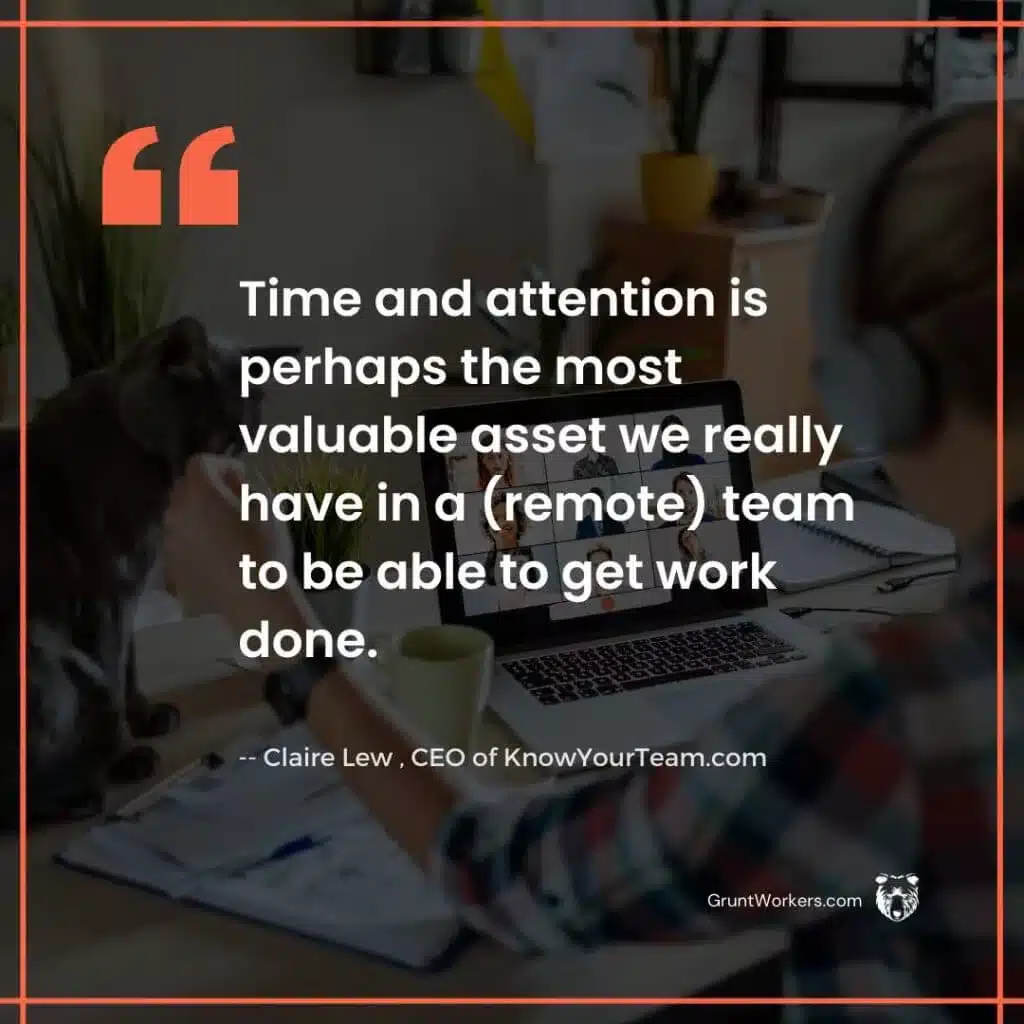
9. Celebrate your wins.
Celebrating your successes is not only a great way to boost team morale, but it also helps reinforce a culture of excellence and the importance of personal well-being.
“When your team feels mentally, physically, and emotionally great, it will show in their overall performance,” reminds Andreea Vanacker of SPARKX5. “Then, find ways to celebrate success. When you celebrate, your body produces oxytocin and endorphins, which reduce stress and boost your immune system.”
When celebrating wins, it’s important to understand what success looks like clearly. In addition to the usual quality, time, and financial metrics, it’s important to prioritize personal well-being as a measure of success.
Consider setting up a regular check-in or review process where team members can share their accomplishments and get recognition for their hard work. This could be a weekly meeting, monthly review, or annual event, depending on the size and structure of your agency.
Be sure to recognize individual contributions as well as team efforts. Highlight the specific actions or behaviors that led to success, and show appreciation for the hard work that went into achieving the goal.
Finally, feel free to get creative with your celebrations. Whether it’s a team outing, a special meal, or a personalized gift, find ways to make the celebration meaningful and memorable for your team.

10. Opt for shorter meetings.
Virtual meetings have become a common way of connecting with colleagues and teams. While meetings can be an effective way of exchanging ideas, setting priorities, and reviewing progress, they can also be time-consuming, unproductive, and often leave people feeling drained.
To maximize the effectiveness of your virtual meetings, consider opting for shorter meetings. Shorter meetings can lead to more productive, engaged, and focused team members. By limiting the length of meetings, you are forced to cut out the unnecessary small talk and focus on the agenda items that must be addressed.
Irfan Khan of CloudSufi says, “Short daily scrums versus two-hour-long meetings are helping businesses encourage communication, identify problems faster, work on them quickly, become more agile, and develop a good cadence in the long run.”
Also, consider reducing the length of your meetings by half or even by a third, and see how much more productive and efficient they become.
You can also provide an agenda before the meeting and stick to it strictly. This allows everyone to come prepared and stay focused on the tasks at hand, making your meetings more productive and beneficial for everyone involved.
11. Provide remote team members with opportunities for professional growth.
As the digital marketing landscape evolves, your remote team members must keep up with the latest trends, technologies, and best practices.
However, working remotely can make it difficult for team members to feel engaged and motivated to learn and grow.
To encourage professional growth and development, it’s important to provide your remote team members with opportunities to learn new skills and take on new challenges. This can include online courses, certifications, workshops, or other forms of training.
Consider allocating a budget for professional development or partnering with training programs that align with your agency’s goals.
In addition, provide your team members with regular feedback on their performance, highlighting areas for improvement and recognition of their achievements.
Offer opportunities for cross-functional collaboration and encourage team members to take on new responsibilities, which will help them grow and develop professionally.
By investing in the growth and development of your remote team members, you’ll improve their knowledge and foster a culture of continuous learning and improvement, leading to greater productivity, job satisfaction, and employee retention.
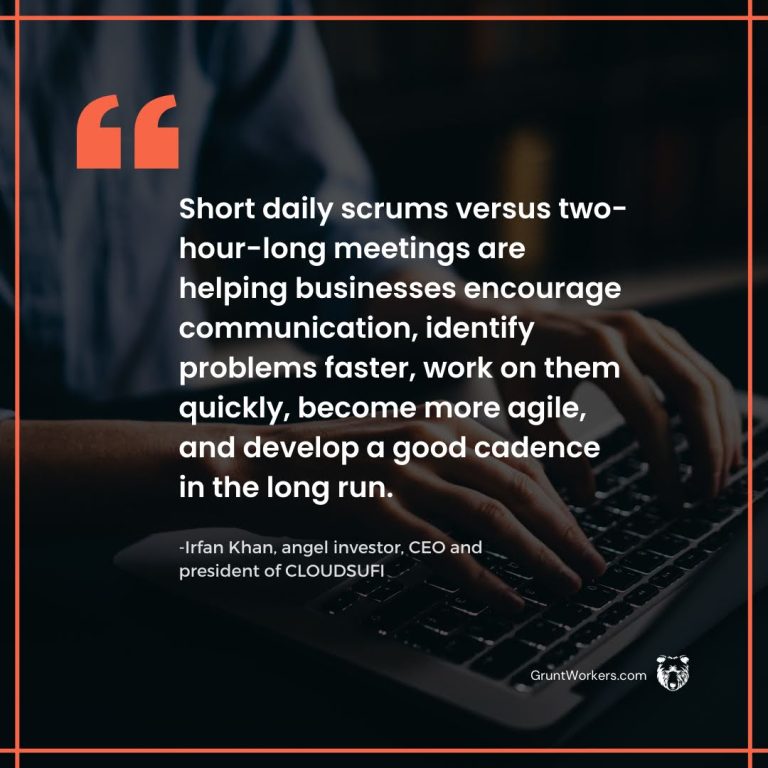

12. Lead with empathy. (Bonus tip.)
As a digital marketing agency owner, leading with empathy can significantly impact your remote team. Being empathetic means putting yourself in someone else’s shoes and understanding their perspective, feelings, and emotions.
Empathy is essential when it comes to communicating with your team members. When interacting with your remote team, consider the challenges and distractions they might be dealing with.
Take the time to listen to their concerns and ideas and encourage open communication. It’s also important to understand that everyone on your team might have different work styles, schedules, and home situations.
“I believe that creating psychological safety, especially for remote or hybrid teams, is critical,” says Krishna Kutty of Kuroshio Consulting Inc. “You can do so by creating a shared purpose, asking for team members’ perspectives, showing empathy, and creating opportunities for levity and team bonding. Then watch your team’s collective confidence, creativity, and productivity rise.”
One way to lead with empathy is to prioritize mental health and wellness. Consider offering mental health resources and encouraging your team to prioritize their well-being.
Another way to lead with empathy is to be flexible and understanding regarding work schedules and deadlines. Your team members may be dealing with caregiving responsibilities, illness, or other unforeseen circumstances that make meeting deadlines or adhering to a standard work schedule difficult.

Conclusion: a Final Word About Remote Team Leadership
Now that you have a range of action items to lead your remote team better, it’s important to take action and make changes.
The first step is to prioritize the items most relevant to you and your team’s needs and start implementing them.
Make sure to communicate with your team members about any changes you’re making and why. Be transparent and open to feedback, as your team’s experience and input can be invaluable in improving your remote work strategy.
In addition, it’s essential to evaluate the effectiveness of the changes you’re making regularly. Monitor progress, measure results, and seek feedback from team members to ensure that the changes improve team productivity, collaboration, and well-being.
Lastly, remember that remote work is constantly evolving, so it’s important to stay informed about the latest trends and best practices. Be open to experimentation, and continue to learn and adapt as needed to keep your remote team thriving.


